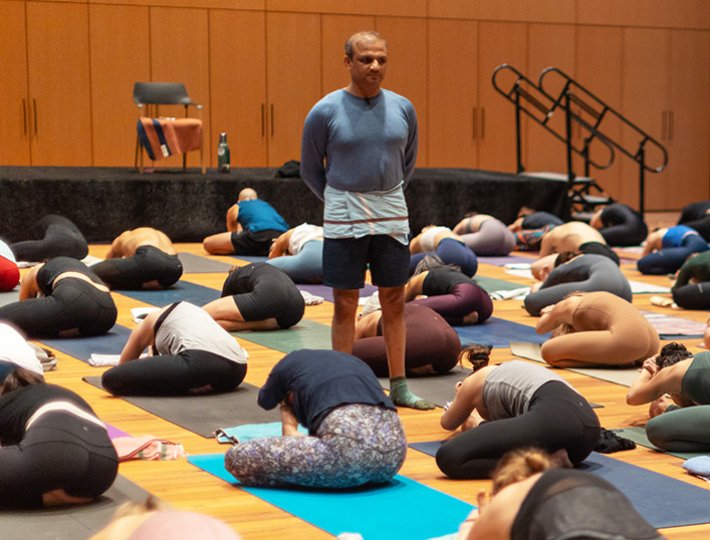I remember my first job out of college. I was the executive director of a Buddhist non-profit and, while one might suspect that someone running a Buddhist organization just sits there in equanimity, I was, in fact, a mad man organizing every event we hosted and burning myself out. I knew that something would have to change.
I turned to my mentors for advice and that is when I was introduced to a set of teachings known as the Four Exhilarations. It was promised that if I did all four of these action items in one day, I would feel uplifted and have a renewed sense of energy. I was hooked already, and dying to know about these secret teachings. Without further ado, I now offer them to you. They are: 1) eat well, 2) sleep well, 3) meditate, and 4) exercise.
Super obvious, right? Of course, I knew that I should do those activities before they were laid out in this set of teachings, and maybe you are in the same boat. These are incredibly simple things that you already might occasionally engage in. Yet, how often do you do all four of them in one day?
Let’s examine our relationship to each and how to better incorporate them into our daily lives.
1. Eat well
We all have our own relationship to food. Some of us have specific things we know we should not eat because it affects our body in a negative way. Other people may impose very strict diets on themselves because swimsuit season is coming. Some of us eat relatively healthy during the week and then consume donuts all weekend (raising my hand here).
Eating well means trusting our body to tell us what it needs, and deeply listening to it. It means not overeating, which is something a lot of us do when we are feeling upset. It means not eating trash, like a full box of cookies (I’ve been guilty of this one, too). It means eating good, nourishing food. Listen to your body, folks, and you will find your way forward on this one.
2. Sleep well
Often, when I’m teaching meditation someone will ask the question, “What should I do if I’m falling asleep during meditation?” I usually joke that I have an ancient Buddhist remedy for anyone who finds themselves consistently passing out on the meditation seat. Want to know what it is? Okay, pay close attention: You need to get more sleep.
There are other helpful things to do in this regard (i.e., drink water and stretch before sitting), but more often than not, we run around thinking we can “do it all” and neglect the need to rest the body in a nourishing way. The the moment we sit down and let the body relax, it’s like, “Thank goodness. I can pass out. Thank you.” The body is telling us it needs more rest.
Sleeping well means getting more sleep than you think you need. If you normally sleep for seven hours, you may need eight. If you can’t get a good night’s sleep, it might be worth trying to nap during the day, even if that’s right when you get home from work. I recommend keeping a good Buddhist (or other spiritual) book on your nightstand so that if you do wake up in the night, you can read a page or two, relax your mind, and enter sleep once more.
Related: A Meditation to Help You Prepare for Restful Sleep
3. Meditate
If you haven’t noticed, after 30 years of practicing it and half a lifetime of teaching it, I’m a big fan of meditation. This is because I know meditation can help us. It can help us be with all of our brilliance, heartbreak, creativity and neurosis. It can help heal our body and mind. It can help us experience the totality of who we are as a human being. And it can help us love ourselves more than we ever suspected possible.
My favorite word for meditation in the Tibetan language is gom. Gom can translate as “meditation,” but it can also be translated as “become familiar with” or “familiarization.” It is the idea that meditation allows us the space and time to become familiar with all of what is going on with us in a given day, providing much needed information in how we could better care for ourselves. By adding a consistent meditation practice to our self-care regimen, we are giving ourselves the tool to discern how best to move forward in all the other areas of our life.
4. Exercise
We have these incredible physical bodies, and simply using them in an energetic way feels uplifting to us. Exercise might look different for you than it does for me. I run, go for long walks, or box. For you it might be yoga, cycling, or Crossfit. I don’t think I’ll ever do Crossfit. Too intense for me. But good for you! Whatever exercise means to you, please incorporate it into your day. I don’t think I have ever exerted myself beyond my comfort level in exercise and felt less uplifted as a result. I always end up feeling much more spirited and level-headed afterward. Even if it’s 15 minutes of cardio or sit ups, see if you can incorporate some exercise into your daily routine.
Balancing All Four
Now, here’s the rub: it’s easy to do one or two of these in a day. You might sleep in, exercise, and then realize you’re running late for work and have to skip meals and meditation. You might eat well all day, meditate, and, thus, decide you don’t need to exercise. This is a way to bring some energy into your day, sure. But what if you did all four of these things?
When you do all four in one day, you will feel more like yourself and you will be able to engage your life in a more meaningful way. Give it a try, and you will see what I mean.











Comments (0)